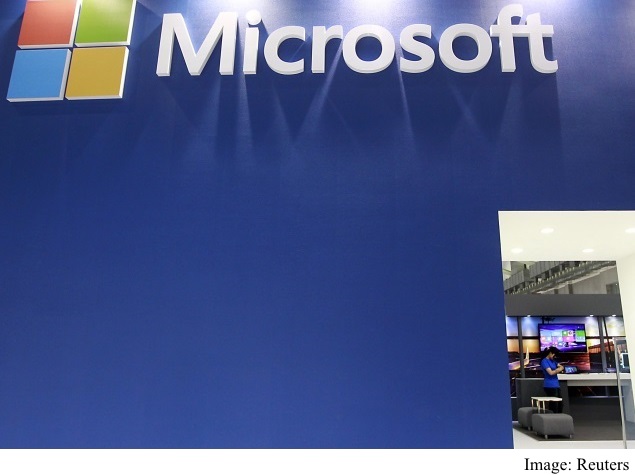- Home
- Others
- Others News
- Microsoft Tells Its Partners To Provide Paid Sick Leave
Microsoft Tells Its Partners To Provide Paid Sick Leave

But the White House announced Wednesday that senior officials, including the labor secretary, would begin a monthlong roadshow around the country to promote paid leave. And in his State of the Union address, President Barack Obama urged Congress to pass a bill giving workers seven days of paid sick leave.
But any federal requirement would need the support of Congress, a tough obstacle.
Yet there is another, emerging model: companies forcing other companies to adopt these policies. On Thursday morning, Microsoft was to announce that it would require many of its 2,000 contractors and vendors to provide their employees who perform work for Microsoft with 15 paid days off for sick days and vacation time.
In some ways, it's a uniquely American solution. In the absence of a federal policy, the biggest and wealthiest companies are performing the role of setting workplace policy for other businesses.
As the economy has become more dependent on contract workers, workers' rights advocates have voiced concern about their working conditions, especially for low-skilled jobs.
The situation is particularly acute in the tech industry, where average full-time employees earn more than $115,000 a year, along with generous benefits like child care, gourmet cafeterias and luxury shuttle rides to work. Many of the contracted service workers - who take care of the children, cook the food or drive the shuttles - earn near poverty-level wages and often do not receive basic benefits like sick leave.
In Santa Clara County, in the heart of Silicon Valley, the median hourly wage for software developers is $64 an hour, and from $11 to $14 for groundskeepers, janitors and security guards, according to Working Partnerships USA, a local labor policy advocacy group. Eighty-eight percent of computer jobs provide paid sick days, compared with 41 percent of building and grounds-cleaning jobs. Three to 4 percent of tech employees are black or Latino, and about 75 percent of janitorial and maintenance workers are.
After pressure from contract workers and labor groups, other tech companies have also made changes. Apple and Google hired security guards as full-time employees instead of contractors, for instance, and Facebook agreed to a contract with substantial raises after its shuttle drivers unionized.
Bradford L. Smith, Microsoft's general counsel, said the company was in part responding to complaints from contract employees who worked alongside full-time employees but did not have the same benefits.
More broadly, he said, Microsoft decided it was necessary given the company's dependence on contractors.
"The research shows that employees who do get these kinds of benefits are far likelier to be happier, have higher morale and are far more likely to be productive," he said.
"If people are sick," he added, "it's not necessarily good to have them go to work because they can infect their colleagues."
The United States is the only advanced economy that does not require paid sick leave, and 43 million workers do not have it, the president said in his address.
In the absence of federal action on workplace issues including minimum wage, some companies like Aetna and Starbucks have made changes themselves. Three states (California, Connecticut and Massachusetts) and a smattering of cities have passed paid sick leave policies.
But an approach like Microsoft's is more unusual.
Derecka Mehrens, executive director of Working Partnerships USA, said it was the responsibility of the bigger companies that employ the contractors to raise the standards.
"When you follow the money, the money comes from the tech companies, so ultimately they could raise the floor for our contract workforce," she said.
Ruth Milkman, a sociologist of labor at the City University of New York Graduate Center, said she was less optimistic that it would become common for big, wealthy companies to play this role.
"It's a moral model, but I don't think there's a high probability it's going to become universal through business initiatives," she said. "The public wants this. The resistance is all from employers. The only way is through public policy."
Microsoft's policy will require contractors that employ 50 or more people to provide workers with either 10 paid vacation days and five paid sick days or 15 days of unrestricted paid time off. Only the employees who have worked with Microsoft for more than nine months will be required to get the leave. Smith said Microsoft expected to pay more for contractors' services to cover the added costs. (Microsoft's own employees get 10 sick days and 15 to 25 vacation days, depending on their years at the company.)
Smith said the company did not know how many contract employees did not already have paid sick leave.
The contractors at Microsoft and many big companies include highly paid engineers, marketers and lawyers as well as lower-paid security guards, cooks and janitors. Professional, educated workers are much more likely to have paid sick leave and other benefits than working-class ones.
"As you get to the lower end of the wage spectrum, it starts to become the exception rather than the norm," Smith said.
For their part, lawmakers rarely discuss mandatory paid vacation time. But they are trying again on federal paid sick leave. Sen. Patty Murray, D-Wash., and Rep. Rosa DeLauro, D-Conn., last month reintroduced the Healthy Families Act, which would give employees seven days of paid sick leave a year.
It was first introduced in 2004 and has never made it to the floor.
© 2015 New York Times News Service
Catch the latest from the Consumer Electronics Show on Gadgets 360, at our CES 2026 hub.
Related Stories
- Samsung Galaxy Unpacked 2025
- ChatGPT
- Redmi Note 14 Pro+
- iPhone 16
- Apple Vision Pro
- Oneplus 12
- OnePlus Nord CE 3 Lite 5G
- iPhone 13
- Xiaomi 14 Pro
- Oppo Find N3
- Tecno Spark Go (2023)
- Realme V30
- Best Phones Under 25000
- Samsung Galaxy S24 Series
- Cryptocurrency
- iQoo 12
- Samsung Galaxy S24 Ultra
- Giottus
- Samsung Galaxy Z Flip 5
- Apple 'Scary Fast'
- Housefull 5
- GoPro Hero 12 Black Review
- Invincible Season 2
- JioGlass
- HD Ready TV
- Laptop Under 50000
- Smartwatch Under 10000
- Latest Mobile Phones
- Compare Phones
- Tecno Spark Go 3
- iQOO Z11 Turbo
- OPPO A6c
- Samsung Galaxy A07 5G
- Vivo Y500i
- OnePlus Turbo 6V
- OnePlus Turbo 6
- Itel Zeno 20 Max
- Lenovo Yoga Slim 7x (2025)
- Lenovo Yoga Slim 7a
- Lenovo Idea Tab Plus
- Realme Pad 3
- Garmin Quatix 8 Pro
- NoiseFit Pro 6R
- Haier H5E Series
- Acerpure Nitro Z Series 100-inch QLED TV
- Asus ROG Ally
- Nintendo Switch Lite
- Haier 1.6 Ton 5 Star Inverter Split AC (HSU19G-MZAID5BN-INV)
- Haier 1.6 Ton 5 Star Inverter Split AC (HSU19G-MZAIM5BN-INV)

















